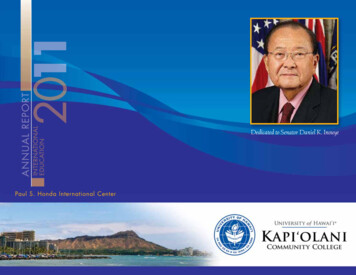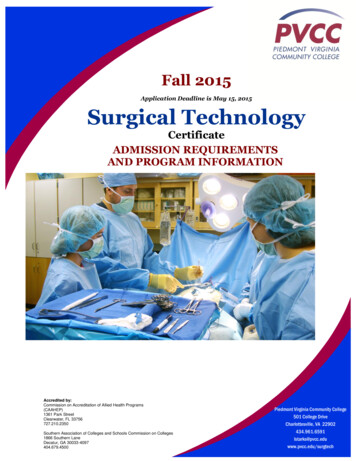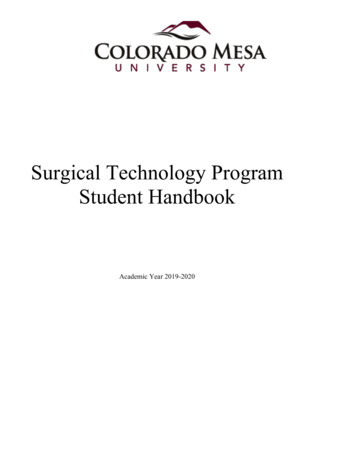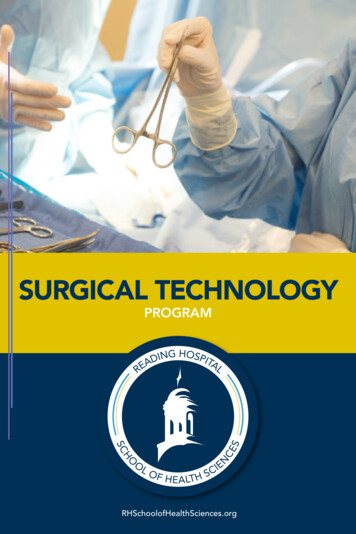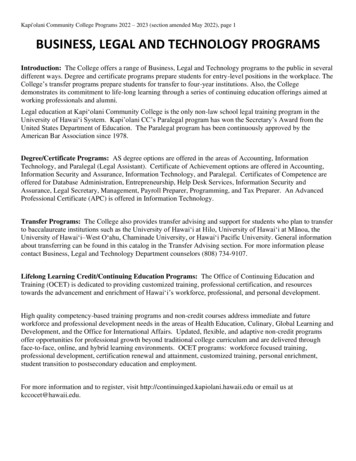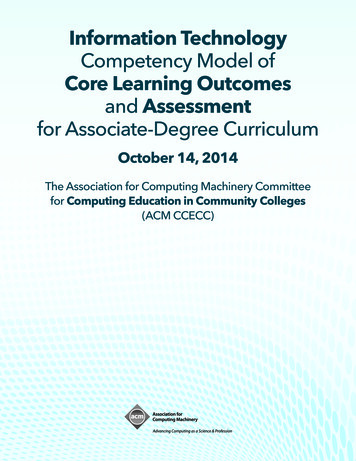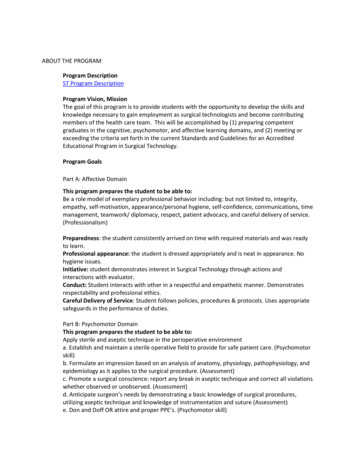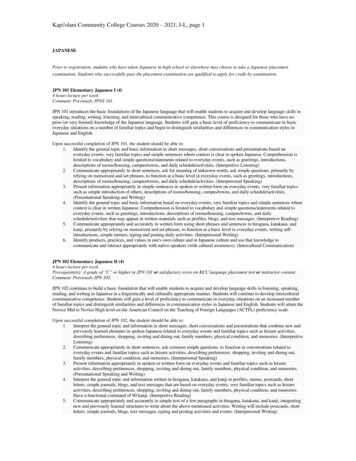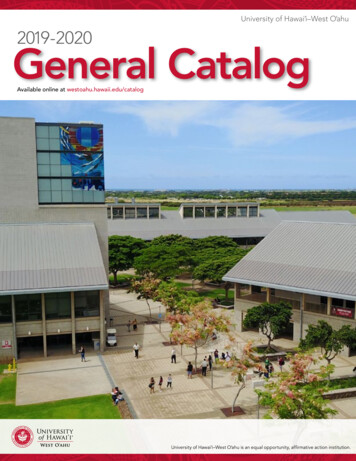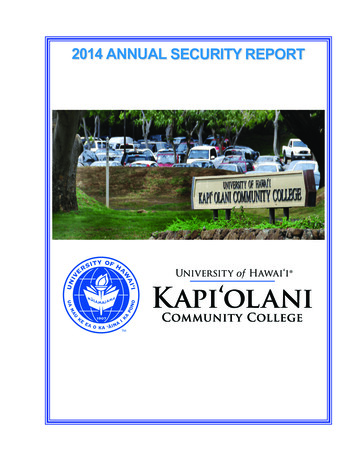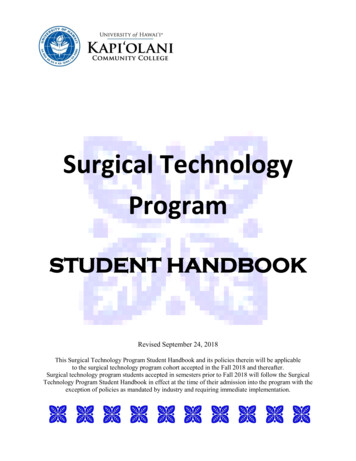
Transcription
Surgical TechnologyProgramSTUDENT HANDBOOKRevised September 24, 2018This Surgical Technology Program Student Handbook and its policies therein will be applicableto the surgical technology program cohort accepted in the Fall 2018 and thereafter.Surgical technology program students accepted in semesters prior to Fall 2018 will follow the SurgicalTechnology Program Student Handbook in effect at the time of their admission into the program with theexception of policies as mandated by industry and requiring immediate implementation.
CONTACT INFORMATIONSurgical Technology ProgramKapi‘olani Community College Nursing Department4303 Diamond Head Road, Honolulu, HI 96816Nursing Department at KCC, Kōpiko 201, phone number . 734-9305Nursing Department at KCC, fax number . 734-9147Kapi‘olani Community College web site.www.kcc.hawaii.eduKapi‘olani Community College’s Surgical Technology Program is accredited by theCommission on Accreditation of Allied Health Education Programs (CAAHEP):25400 U.S. Highway 19 North, Ste 158Clearwater, FL 33756727.210.2350www.caahep.orgThe Surgical Technology Student Handbook Committee has made every reasonable effort todetermine that information in this handbook is current. However, the Nursing Department maymake changes without notice based on college decisions that directly affect the department’spolicies and procedures.Student Handbook Committee Members:Chris NadamotoToni ChoyWesly MaekawaCrystalyn HottensteinProgram CoordinatorInstructor/Clinical CoordinatorNursing Department CounselorNursing Department Counselor
TABLE OF CONTENTSMission Statement .1Surgical Technology Program Philosophy .1Surgical Technology Program’s Student Learning Outcomes .3Surgical Technology Program’s Criteria for Successful Completion and Graduation.4Academic Policies .5Academic Standards.5Attendance .5Examinations.6Clinical Experience .7Clinical Practicum Performance .7Clinical Practicum Rules and Regulations .7Clinical Uniform Attire and Regulations .8Affiliation To Agencies .8Confidentiality .9Electronic Devices .9Health and Safety .10Health Requirements .10Technical Standards .11Occupational Safety .11Academic and Health Records .12Outside Employment .12Disability Support Services .13Student Success Contract and Referrals .13Phase or Program Withdrawals .13Cancellation and Refund Policy .14Phase or Program Readmission .14Resolving Student Concerns.15Certification/Examination .15Graduation .16
College Policies .16University Policy on Nondiscrimination and Affirmative Action .16Title IX Disclosure .17Professional Behavior and Conduct .17Disruptive Behavior Policy .17Academic Dishonesty .18Cheating .18Plagiarism .18Financial Obligations .19UH Policy on Email Communication .19Privacy Rights .19Student Academic Grievance Procedure 19Tobacco Products Policy.20
MISSION STATEMENTThe goal of the surgical technology education at Kapi‘olani Community College is to develop safe,caring and competent practitioners who recognize the responsibility for life-long learning. Theprogram is designed to prepare the surgical technologist to function as a sterile member of thesurgical team and to take the national certification exam. Consistent with KCC’s philosophy, theSurgical Technology Program may be the terminal point in the student’s formal education or it mayprovide an opportunity for the student to pursue additional training and education in a related healthcare field.SURGICAL TECHNOLOGY PROGRAM PHILOSOPHYThe Kapi’olani Community College Department of Nursing is committed to educating futurecompetent, caring, and safe-practicing surgical technologists that will serve our island community.The Surgical Technology Program’s goals for its graduates are to nurture their ability to andpromote human health, to act on informed practices, to develop their professional identity, and tomaintain a continuous need to learn about the surgical technology profession.Surgical Technology Program graduates will advocate and promote health in order for their patientsto flourish in health and ultimately in their lives. The surgical technology graduate will exercisejudgment developed through constant learning of real world events. From this experience, theirknowledge will provide safe and quality care to their patients and their families. The surgicaltechnology graduate will develop a professional identity that is based on integrity, responsibility,and ethical practices. The spirit of constant learning underlies clinical practice and will help thegraduate toward new surgical technology practices and gain insight for improved patient care. Thecore values within the Nursing Department philosophy are caring, diversity, ethics, excellence,understanding of holistic principles, integrity, and patient-focus.Surgical Technology Program students are unique and caring individuals with their own passionand personal motivation. The Kapi’olani Community College nursing faculty engages in acollaborative relationship with students by offering guidance and support in their surgicaltechnology student’s professional development. The Kapi’olani Community College SurgicalTechnology educational program is based on concepts relating to humans, health, illness, and theenvironment.Humans: Humans are unique beings with biological, psychological, sociological, cultural andspiritual dimensions. These dimensions are in constant interaction and inseparable. In order tofunction optimally and maintain a state of wellness, needs related to these dimensions must be met.Every human, throughout their lifespan, has the potential for growth and development in each ofthese components. Age and stage of development affects the nature and intensity of specific needs,as well as the ability to independently meet and/or communicate them.Our program believes humans are unique with inherent qualities including dignity and worth.Humans have the right to direct their own lifestyle and are encouraged to communicate their needsand feelings to members of the health care team. They have the right to obtain health care servicesthat will assist them in achieving the highest attainable standard of wellness. Humans have the right1
and responsibility to participate in the maintenance of their health and in the planning of relatedcare during altered states of wellness.Health and Illness: We believe that each human exists on a health-illness continuum that maymove from high level wellness to severe illness and death. Humans are in a constant state ofadjustment to internal and external environmental stresses as they strive to meet their personalneeds. A common goal for all humans is to flourish as each defines their own state of being.Environment: We believe that movement on the health-illness continuum is caused by internal andexternal stressors, which can affect humans and the attainment of their needs. The physicalenvironment is an important aspect to understand how humans adapt within their environment.Successful adaptation leads to a state of optimal function and wellness. Unsuccessful adjustmentmay lead to changes in wellness, to illness, and possibly to death.2
SURGICAL TECHNOLOGY PROGRAM’S STUDENT LEARNINGOUTCOMESUpon graduation, the Surgical Technology student will be able to:1. Apply background knowledge of the basic sciences, surgical anatomy and aseptic technique in surgicalprocedures.2. Describe operating room techniques and their relation to patient care.3. Practice good personal hygiene habits and state their effect in reducing infection.4. Describe the interdepartmental relationships between the operating room and other hospital services.5. Identify the need for adhering to hospital policies and procedures, ethics, and medical, moral and legalcodes.6. Demonstrate a rigid surgical conscience when functioning as a member of the surgical team.7. Apply, and when necessary, modify aseptic principles when encountering unexpected emergencysituations.8. Demonstrate knowledge and understanding of entry level procedures in order to function as a member ofthe surgical team.9. Demonstrate awareness of the responsibilities and limitations of the role of the Surgical Technologist andwork within these limits.10. Demonstrate responsible behavior as a health care professional.11. Demonstrate the ability to perform the role of the first scrub on entry level surgical procedures.12. Successfully pass the National Certification Exam given the National Board of Surgical Technologyand Surgical Assisting (NBSTSA).3
SURGICAL TECHNOLOGY PROGRAM’S CRITERIA FORSUCCESSFUL COMPLETION AND GRADUTION1.Students must pass the theoretical component of the program with a letter grade of "C" orhigher.2.Students must pass the Lab Check-off.3.Students must perform at a "Satisfactory" level in Clinicals.4.Students must complete the required number and type of clinical cases.5.Students must complete the National Certification Examination administered by the NationalBoard of Surgical Technology and Surgical Assisting, while in the program.6.If a student is not permitted to continue in a clinical rotation by a clinical facility, the studentwill be required to withdraw from the Program.7.Students must conduct themselves according to the Kapi'olani Community College StudentConduct Code.8.All badges, books and property of the Program must be returned prior to Graduation.4
ACADEMIC POLICIESAll students enrolled in the Surgical Technology Program at Kapi‘olani Community College mustabide by this handbook and the general KCC policies in effect for all students.Kapi‘olani Surgical Technology Program Policies are revised periodically. A copy of the revisedand current policies is made available to each student at that time. It is each student’s responsibilityto read and clarify his/her understanding of the policies.ACADEMIC STANDARDSA satisfactory grade must be obtained in the theoretical and clinical components of the course topass each Surgical Technology Program phase. This means a grade of “C” or higher in the theoryportion of the course and a “Pass” in the clinical portions. A failing grade in either theory orclinical results in a failing grade for the course. Grading for clinical experience is on a pass/nonpass basis. (Refer to course syllabus for grading criteria).ATTENDANCE1.Students should attend all scheduled classes and skills/clinical laboratories. Although the gradeearned is based on the student’s attainment of the course objectives, regular and punctualattendance is expected as habitual tardiness and/or absences will result in failure.2.Students are responsible for all classroom activities, assignments, and handouts. Handouts willbe given out only in class or immediately after class. If an absence is unavoidable, arrangewith another student to pick up handouts.3.The surgical technology student is to be on time at the assigned time of clinical/lab as definedby the clinical instructor. The student who is tardy may be given only one warning or senthome. For all subsequent tardiness, the student will be sent home and an absence will berecorded for that day.4.Clinical absences can be made up on non-clinical days with prior permission of the clinicalfacility and the KCC instructor.5.In order to be eligible to take the national certification exam, students must attend lectures andcomplete all hours of clinical. Unexcused absences will place the student at risk of not meetingthese requirements.6.Each student is expected to come to the clinical experience appropriately prepared to carry outhis/her assignment. Students who are not adequately prepared will be sent home from aclinical experience. This will be deemed as a clinical absence and will be treated as such. Ifthe student lacks the requisite skills, the student should formulate a plan for meeting thoselearning needs.5
7.Only those students currently registered for the class will be allowed in the classroom, campuslab, and clinical sites.EXAMINATIONSExamination ProceduresStudents are expected to take the course examinations on the scheduled dates. If a studentanticipates being absent, he/she must notify the instructor prior to the day of the exam. If anemergency arises, it is up to the student to notify the instructor as soon as possible. In all cases, it isup to the instructor to determine if a make-up exam will be given. Note: The format/style for amake-up exam/quiz is at the discretion of the instructor and may differ from the regular exam.Exams are considered property of the instructor.During examinations you will be asked to abide by the following:1. Spread out in the classroom as much as possible.2. Bags & all personal items will be kept in the front or outside of the classroom. If you areanticipating an emergency contact, please inform those persons to call the front office tomake contact with you or request that the faculty monitor your cell phone or pager (onvibrate mode please).3. Attend to all personal needs before the exam. Most tests are between 30-60 minutes longand most adults can manage without a break during that time frame.4. Department issued calculators will be provided for tests containing math items.5. Notes may not be taken during the exam review.6
CLINICAL EXPERIENCECLINICAL PRACTICUM PERFORMANCE1.Students are expected to scrub on all assigned cases with a preceptor, gradually increasing thescope of responsibilities during the surgical procedure. Students will begin by acting as thesecond scrub person, and move into the first scrub position as deemed appropriate by theinstructor, preceptor and operating room staff.2.Elements constituting unsatisfactory performance include but are not limited to those actionswhich place the patient in physical or emotional jeopardy such as:a. Not maintaining a safe environment such as not reporting broken equipment or a hazardousconditionb. Violation of sterile technique without making the necessary correctionc. Failing to observe for and use Universal Precautions in the care of all patients, especiallyhand washing before and after donning and removing glovesd. Ignoring the privacy of patiente. Breaching patient confidentialityf. Failing to handle one’s own anxiety appropriatelyCLINICAL PRACTICUM RULES AND REGULATIONS1.Eating may be permitted in the clinical setting in designated areas only.2.No smoking is permitted in the clinical setting.3.When in the clinical area outside of scheduled clinical hours, professional attire is required,including name pin. Preferred attire will be defined in those instances when uniforms are notrequired. No mini-skirts, shorts, bare midriffs or open-toe or heel shoes are allowed when onhospital premises.4.Clinical facility phones shall NOT be used for personal calls.5.Interactions with staff, faculty and peers must be professional, courteous and diplomatic at alltimes.6.Taking of photographs is prohibited in all clinical settings.7.Students are advised that any sharing of clinical information on a social networking site, orthrough email is a violation of HIPAA, and is forbidden.Clinical evaluations are done continuously and are based upon student performance and progress.The evaluations are based on course objectives.7
CLINICAL UNIFORM ATTIRE AND REGULATIONS1. Uniform scrub tops and bottoms will be provided by the clinical practicum facility.2. Shoes and laces must be clean and in good repair. Footwear must include clinical or sportshoes, leather or leather-like (no canvas) and low cut. Sandals or open toed shoes or open-backshoes are not allowed.3. Students should maintain proper hygiene and be neat in appearance.4. Men must be clean shaven or facial hair must be closely cropped.5. Conservative use of make-up is allowed.6. No perfume or body cologne will be permitted in clinical setting.7. Attention to oral and personal hygiene is expected in the lab/clinical settings.8. Students cannot wear rings in the clinical area.9. One pair of small, inconspicuous posts may be worn as earrings but must be covered by surgicalcaps.10. Fingernails must be short and clean. No nail polish may be worn. No artificial nails allowed.11. Chains, necklaces, bracelets or body piercing ornaments (including tongue, lip and nose studs)are not to be worn.12. Eyelash extensions are not allowed.13. The student identification badge and agency required badges will be worn when in the clinicalfacility and removed when the student is not in a student role.AFFILIATION TO AGENCIESDue to the complex nature of the health care industry, various rules, policies and procedures havebeen instituted by hospitals that must be met and adhered to by KCC surgical technology students.If a clinical facility does not give permission for a KCC surgical technology student to conductclinical in their facility, the student will not be allowed to continue with their clinical assignmentand course. Furthermore, the Nursing Department is not obligated to find an alternative clinicalplacement for the student. The student will be required to withdraw from the surgical technologyprogram.In the clinical setting, the instructor and preceptor will, with agency staff, provide for the directsupervision of students. The agency requires that assigned instructors and students abide by thepolicies of the Agency while using its facilities, including confidentiality of all client information asset forth by HIPAA guidelines. The affiliating agency reserves the right to exercise its sounddiscretion, after consultation with the college, to excuse any student from its premises in the eventthat such person’s conduct or state of health is deemed objectionable or detrimental to the bestinterest of the agency and to the clients. This includes behavior, dress and hygiene. Violation ofthis policy may result in program dismissal.Effective January 1, 2004, the Joint Commission for Accreditation for Healthcare Organizationsrequired all TJC approved agencies to require similar procedures for all “staff, employees and8
volunteers” which includes students with respect to health clearances and employment screeningexams. Employment screening exams may include criminal background checks and urine drugscreening.The University of Hawai‘i system has examined this requirement and it is now addressed in currentUH publications regarding health and related programs. The University Legal Council in support ofthis requirement has issued the following statement:“It is the responsibility of the student to satisfactorily complete affiliated hospitalbackground checks and drug testing requirements in accordance with procedures andtimelines as prescribed academic requirements that involves clinical practice in a Universityaffiliated hospital setting with no substitution allowable. Failure of a student to completethe prescribed University nursing clinical practice in a University affiliated hospital shall bedeemed as not satisfying academic program requirements.”If the student does not meet all the requirements established by the hospital, the University will notbe responsible to provide a substitute clinical facility or clinical experience. Therefore, refusal of ahospital or clinical facility to allow a student in their clinical facility due to negative informationwill result in the student not being allowed to continue and may prevent any future readmission inthe surgical technology program.CONFIDENTIALITYAll client information, which comes to the attention of the student or faculty member, is considered“Confidential.” This includes, but is not limited to the following: talking about patients whileoutside of the immediate clinical areas, accessing private health information on anyone other thanthe patient the student cares for, inputting information with the client’s name or other identifiabledata onto a personal computer, removal of any part of the medical record, duplicating any part ofthe patient’s records, including photocopying and/or photographing, any form of patientinformation transmission over the internet, email and/or social media sites, and removing anydocument (physical or electronic) from the clinical area. Breach of confidentiality may lead tocourse failure, program dismissal, and HIPAA sanctions as effected by the host agency.ELECTRONIC DEVICESPagers, cellular phones and other electronic devices are to be OFF during class and clinical hours.Receiving and making personal phone calls are not allowed on the clinical unit.9
HEALTH AND SAFETYHEALTH REQUIREMENTSAll students must meet current health requirements. Those who are deficient in any onerequirement will not be permitted to enter the clinical area and/or may not be able to register fornursing courses. A student may be asked to leave the program if the deficiency is not cleared. It isthe responsibility of each student to keep these requirements and certifications current throughoutthe duration of enrollment.Please submit all copies of documents to the nursing office. The Nursing Department will notprovide copies back to the student. It is the student’s responsibility to keep original documentsprior to submitting duplicated copies to the Nursing Department. With the student’s consent, theirhealth/records will be released to specific clinical facilities.Criminal background check and urine drug screening results are to be kept by the student andshown to the designated person at the agency requiring the information by a specified date.The nursing department has established health document guidelines so as to respond to the healthcare facilities’ expectation that students are cleared to participate in their clinical practicum on atimely basis. Therefore, newly-admitted surgical technology students will be required to submittheir health documents by deadlines to be confirmed within their acceptance letter.1. Tuberculosis Clearancea. A two-step TB skin test (PPD) OR documentation of two consecutive years (not 12months apart) of negative skin tests OR a current negative chest x-ray within one year ofclinical assignment.b. Skin test (PPD) must be completed yearly and current throughout the semester.c. Students who have had a positive skin PPD skin test must provide documentation on thedate of the positive reading.d. Additional health data may be required by the host agency.2. The student must show current immunization records or titers for Measles, Chicken Pox(Varicella), and Mumps. A positive titer for Rubella must be submitted. A titer is a bloodtest that indicates the level of your immunity to a particular disease. Measles immunity can beshown by either a positive titer or proof of 2 MMR vaccinations. Mumps immunity can beshown by either a positive titer or an MMR vaccination as an adult, or 2 MMRs as a child. Theprovider must sign the dates of the injections. Immunity for Varicella (Chicken Pox) can beshown by either a positive titer, or documentation of 2 Varivax vaccinations. Students attendingclinical at Tripler Army Medical Center must show proof of Hepatitis B vaccinations orimmunity.3. The Hepatitis B vaccine shots are recommended for all students. If a student refuses to havethe series of three shots, the student must sign the “Declination of Hepatitis Immunization”form.4. Tetanus Immunization—the tetanus immunization is required of all entering students and musthave taken place within the last 10 years.10
5. Professional Liability Insurance is required of all students and helps to protect the student incase of a lawsuit. Forms are available at the nursing office. Insurance must be renewed everyacademic year. Proof of payment is required at time of registration/orientation.6. Personal Health Insurance—Students are required to have basic health insurance coveragethroughout the nursing program. Student Medical Plan Application forms are available at theStudent Activities Office.7. Current CPR—Students must have the Healthcare Provider Level or Professional Rescuer,Basic Life Support level (one-man, two-man, infant and child rescuer, AED use, and obstructedairway) and must be current throughout the semester.TECHNICAL STANDARDSBefore entering the KCC Surgical Technology Program, a student shall provide documentation ofsensory and mobility standards that support the student’s ability to perform basic surgicaltechnology functions. The technical standards assessment must be current and performed withintwelve months prior to the first day of instruction. At any given time, reassessment of the student’sability to perform basic technical standards may be required at the discretion of the nursing faculty.Continued evidence of minimal function standards is required to safeguard the student, the client,fellow classmates and other health care agency staff. It is the student’s responsibility to informthe nursing faculty of any change in physical or mental status which may alter basicsensory/mobility functions.OCCUPATIONAL SAFETY1.Any accident or injury in the clinical area and/or campus to any student or patient must bereported to the instructor immediately. When there is an accident, needle-stick, exposure tobody fluids or injury to a student in the clinical area, the student shall inform the instructor incharge, report for emergency care as indicated and, if necessary, the personal physician will beinformed. The student must comply with the policies of the clinical facility by reporting theincident to the charge/supervisory nurse and completing any facility forms as requested. In thecase of an injury, the surgical technology program requires the submission of an incident reportform. The report form is obtained from the faculty instructor and is collaboratively completedby the student and instructor. Treatment costs and subsequent testing for infectious disease arethe responsibility of the student. (In the case of injury, tetanus immunization within the last fiveyears is recommended.)2.Students must always use Standard Precautions and follow policies regarding the handling ofneedles and other sharps in order to minimize the risk of HIV, Hepatitis and other infectiousdiseases.3.Students are not covered by Workers’ Compensation. Therefore, any medical care costs fromaccidents, injuries or illness are the student’s responsibility.4.Students may be exposed to a variety of illnesses while enrolled in the program. Students areurged to maintain good health practices and to obtain medical care and treatment as need
Kapi'olani Community College's Surgical Technology Program is accredited by the Commission on Accreditation of Allied Health Education Programs (CAAHEP): 25400 U.S. Highway 19 North, Ste 158 Clearwater, FL 33756 727.210.2350 www.caahep.org The Surgical Technology Student Handbook Committee has made every reasonable effort to
